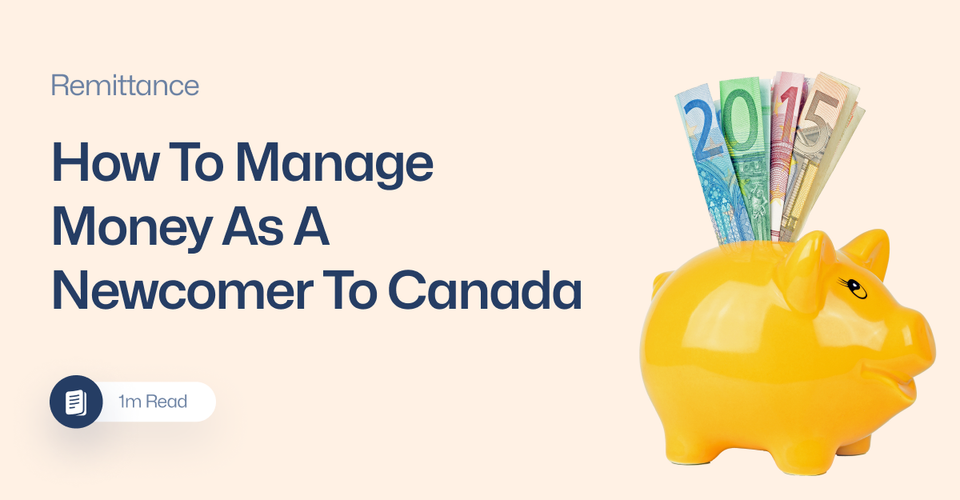How To Manage Money As A Newcomer In Canada

Moving to a new country like Canada is an exciting adventure, but it also brings a host of financial challenges. As a newcomer, you may need to quickly adapt to unfamiliar banking systems, different types of financial products, and a new currency. Effective money management is crucial to ensuring a smooth transition and building a secure financial future in your new home.
Here are some key tips for managing your money effectively as a newcomer to Canada:
1. Open a Canadian Bank Account
One of the first steps to managing your finances in Canada is opening a bank account. While you may already have access to your home country’s accounts, operating solely from them can lead to high international fees and make it difficult to manage day-to-day transactions. Most Canadian banks offer specialized accounts for newcomers with benefits like low fees and waived service charges for the first year and periodic incentives and perks such as AirPods and iPads. Having a Canadian bank account also allows you to receive payments, pay bills, and set up direct deposits more easily.When choosing a bank, compare services such as account fees, interest rates, and access to credit-building products like secured credit cards. Big banks like RBC, TD, Scotiabank, CIBC often have newcomer packages that can provide financial flexibility as you settle into your new life.
2. Understand Credit and Build a Credit History
Building a strong credit history is essential in Canada, as it can impact everything from renting an apartment to securing a mortgage, buying a car or loan. In many cases, your credit history from your home country may not transfer to Canada, which means starting from scratch, although banks like Scotiabank are now allowing credit transfers. The good news is that there are ways to build credit quickly. Consider applying for a secured credit card, which is backed by a deposit you provide and allows you to start building a credit history by making small purchases and paying your balance on time. Responsible credit usage, like keeping your balance low and making payments before the due date, will improve your credit score and give you access to more financial opportunities in the future.
Additionally, while building your credit score, you can also use debit cards (e.g. KOHO) that offers cashback rewards and helps you stick to a budget without adding to your credit debt.
3. Create a Budget and Track Your Expenses
Living in a new country means facing different costs of living, including housing, transportation, groceries, and entertainment. To avoid financial stress, it’s crucial to create a budget that reflects your income and expenses in Canada. Start by listing all your essential monthly costs, such as rent, utilities, and food. Then, add discretionary spending for things like dining out, entertainment, and travel. Tracking your expenses will help you stay within your budget and prevent overspending. Tools like budgeting apps (e.g. Mint, YNAB) can help simplify this process by categorizing your spending and sending you alerts when you are nearing your limits.
4. Be Smart About International Money Transfers
Many newcomers regularly send money back home to support family or manage obligations in their home country. However, international money transfers can come with high fees and fluctuating exchange rates that affect the amount your family receives. To avoid losing money on fees and unfavourable rates, look for low-cost money transfer services that offer competitive exchange rates. Zole is a great option, providing secure and affordable cross-border transfers between Canada and Nigeria, with instant delivery and no hidden fees. Being mindful of the costs involved with international transfers will help you save more in the long run.
5. Take Advantage of Financial Resources for Newcomers
Canada has a wide range of financial resources aimed at helping newcomers adapt to the country’s financial system. Government services like the Canada Revenue Agency (CRA) offer free tax filing help and provide valuable information on tax credits you may be eligible for, such as the GST/HST credit and the Canada Child Benefit. Non-profit organizations and settlement agencies also offer financial literacy workshops, budgeting advice, and one-on-one financial counseling to help newcomers get on the right track. These resources can be invaluable when trying to understand Canadian tax laws, credit systems, and long-term financial planning.
6. Plan for Your Long-Term Financial Future
As you become more comfortable managing your finances in Canada, it’s important to think about your long-term goals. Start by building an emergency fund, which can help cover unexpected expenses like medical bills or urgent travel needs. Aim to save enough to cover at least three to six months of living expenses. You should also consider opening a Registered Retirement Savings Plan (RRSP) or a Tax-Free Savings Account (TFSA) to save for retirement and other future financial needs. These accounts offer tax advantages that can help your savings grow faster, giving you a head start on building a secure financial future.
7. Understand Canadian Taxes
Filing taxes in Canada is different from other countries, and as a newcomer, it’s important to familiarize yourself with the system. Income tax is paid both federally and provincially, and tax brackets vary depending on your earnings. It’s essential to file your taxes on time and declare all your income, whether earned in Canada or abroad. Many newcomers may also be eligible for tax credits or deductions, such as the First-Time Home Buyer Incentive or Public Transit Deductions, which can reduce your tax bill. If you are unsure how to navigate Canadian taxes, consider consulting a tax professional or contact agencies such as H&R Block.
Managing money as a newcomer to Canada can be challenging, but with the right knowledge and strategies, you can gain control of your finances and build a secure future. By opening a local bank account, understanding credit, and being mindful of your expenses, you will set yourself up for financial success.
And when it comes to sending money internationally, platforms like Zole can help you save on fees and manage your cross-border responsibilities efficiently. With careful planning and smart financial decisions, you will thrive in your new financial environment and you can also reach out to friends/family who have been resident in the country for advice and tips.




Comments ()